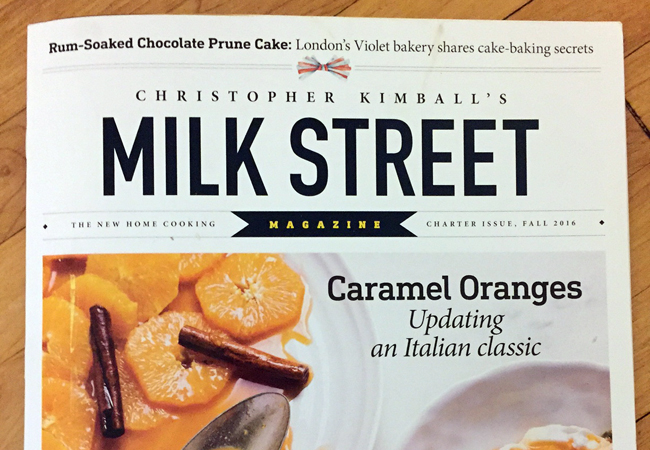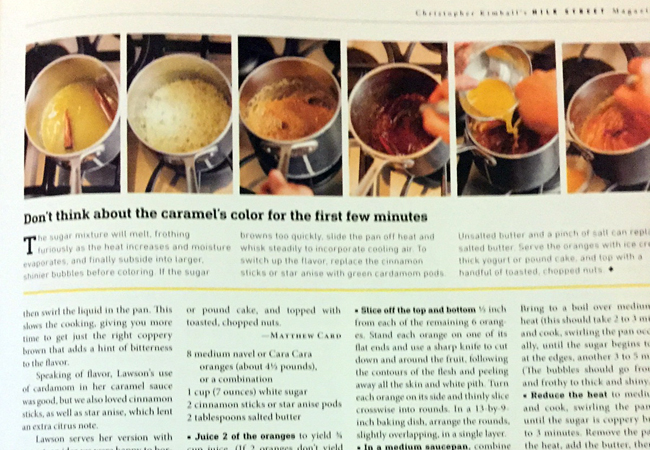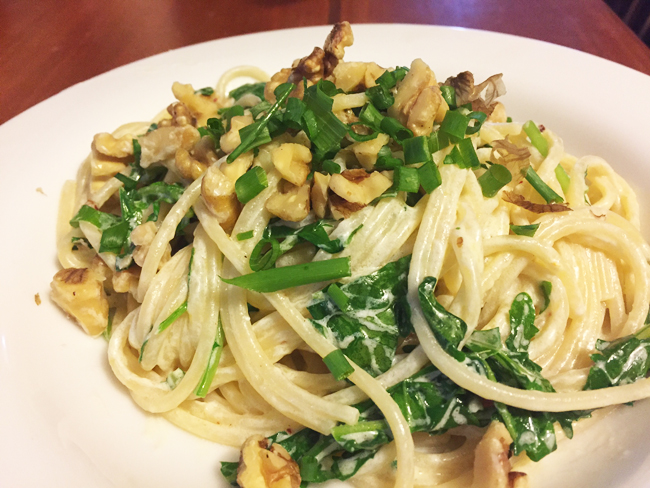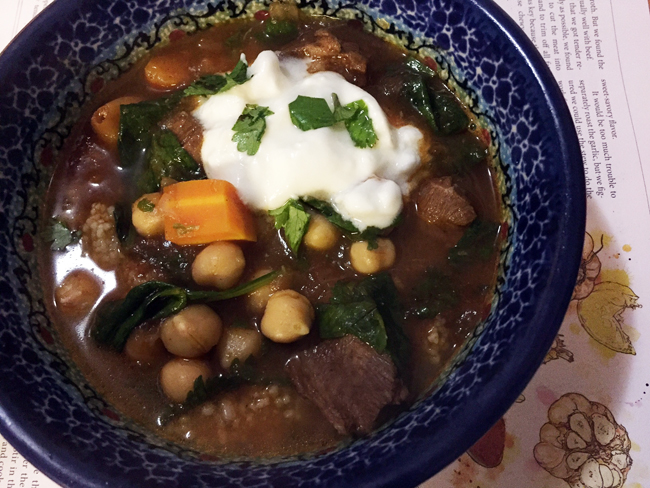
The Heavy Table is a magazine dedicated to covering the food and drink of the Upper Midwest, and we hew to that mandate, sometimes to the point of pain. But the launch of Christopher Kimball’s Milk Street Magazine (and other assorted internet properties) is worth bending rules for.
You would not be reading the Heavy Table were it not for Christopher Kimball and his excellent Cook’s Illustrated magazine and recipe book. In my early 20s, while working as a Middle East news editor in Boston, I found myself increasingly drawn toward cooking as an escape from the day-to-day of cynical diplomatic maneuvering and suicide bombings. It was cooking my way through Cook’s Illustrated — not every recipe, and certainly not in any kind of order — that taught me how to cook. The recipes were logical, exacting, and clear. When they demanded a lot of you, they also explained the dividends you’d reap, meaning that you could always run a time-to-flavor cost-benefit before starting to cook.
More than anything else, though, Cook’s Illustrated recipes grounded you in techniques. If you didn’t know how to saute, or properly slice an onion, or brown meat for a stew, or execute any number of the fundamental-to-the-point-of-being-invisible operations that it takes to make a good meal, you’d learn them just by walking through the recipes. In short, before Cook’s Illustrated, I knew just about nothing. After, I could put out 10 or 20 foundational dishes that were enough to start building a lifestyle (and eventually a career) around.
You may not think that understanding how to cook is a requirement when it comes to reviewing food and interviewing chefs and purveyors. And it isn’t, in fact. But it’s so dramatically helpful that it’s highly suggested to anyone who wants to write anything more than a few Yelp reviews. For example, until you’ve spent two days making croissants from scratch, you can’t quite grasp how or why the croissants of the world vary — from the oily, Francophobic garbage sold at gas stations to transcendent puffs of pure, buttery joy.

You get that there are better and worse croissants, in theory, but the practice of working the dough and baking them off gets you into the mind of the baker who does it right (or the baker who cuts some understandable corners … or some not so understandable). It’s making croissants from scratch that makes me feel comfortable writing that the delicate, flaky, fragile, chewy, lovely croissant I ate at Meritage on Sunday (above) was one of the best I’ve had anywhere, and probably charts on my all-time top-10 list.
Back to Milk Street. Now that America’s Test Kitchen has become a megabrand and cast Christopher Kimball (acrimoniously) to the side, he’s mounting a comeback. Milk Street in many ways feels like the graduate school version of Cook’s Illustrated — logically deconstructed and thoughtfully presented recipes, yes, but revolving around finer points that might lose most novice home cooks. Some examples: the fine art of properly whipping egg whites for baked goods; why the Maillard reaction isn’t needed to make a respectable stew, AKA don’t bother searing those meats before you start; reviving the lost art of covering orange slices in a simple caramel for a memorable dessert.

It’s esoteric unless you’ve been cooking for a while, at which point it all becomes pretty damned fascinating. Every recipe turns on a single clear, thoughtfully expressed point. For example, “The New Creamy Pasta Sauce” asserts that cream-based pasta sauces generally fail by being finicky to make and / or decomposing into grainy messes. I’ve been there. Perhaps you’ve been there too. The recipe uses goat cheese beaten with olive oil, salt, and red pepper to create a sauce that doesn’t break and covers all of your pasta beautifully.

I tried the recipe, and it was simple and straightforward, and it worked. It felt like an incomplete thought (the addition of some chorizo and / or peas, for example, might really help bring the dish together and complement the heat from the red pepper flakes), but that’s OK. The main point was to get you to a place where you can make your own creamy sauce in a jiff and then roll from there. As an experienced home cook, I learned something. And that makes me happy.

Better still was the magazine’s recipe for a taginelike lamb and chickpea stew — minus the searing of the meat. The recipe uses a spice blend (and a cilantro and lemon juice finishing step) to build flavor, saving you the effort of rotating a bunch of browning cubes of meat. I was skeptical, having made hundreds of stews by rotating bunches of browning cubes of meat. But lo and behold, the sear-free stew was a blockbuster: deep flavored, mellow, approachable, sustaining, and — of course — even better the next day. All with no searing! Hallelujah.
Were I to make it again, I’d cut the liquid by a third, cook the carrots for another 10 minutes, and up the amount of meat by a few ounces. Those are minor quibbles. The base recipe is pretty much golden.
If a food magazine can bat .500 — one keeper recipe per two issues — it’s doing OK. Milk Street is batting 2,000 (if that’s possible? probably not) after its first issue, which is highly encouraging, particularly since there are still another three or four recipes I intend to try. (Next up: pinchos morunos — Spanish spice-crusted pork tenderloin bites.)
All of this writing is to make two central points:
1. If you’re ever writing a recipe to share with others, the laser-focused, “what does this do better?” approach of Milk Street really can’t be beat.
2. Milk Street is in every way a worthy successor of Cook’s Illustrated. The first year is $20 for 6 issues. I can’t think of a better way to spend $20 vis-a-vis improving your experience in the kitchen, unless you currently don’t own a skillet.

Cook’s Illustrated taught me to be a better cook. It satisfied my curiosity about why I was doing something and not just the how. I used to be a most loyal subscriber and reader. I couldn’t imagine not having every issue. Now, the whole enterprise has become a bloated marketing machine where every layer of access comes with a hefty price tag and I’ve given up. I have become very disillusioned with what was once my favorite magazine. I’m hoping that Kimball’s new venture will be more accessible. I’m eagerly awaiting for the first issue to appear in my mailbox.
I still subscribe to CI, but I no longer subscribe to any of the other magazines or websites. It became ridiculous, and I couldn’t even keep track of my memberships! I think I was paying around $75 a year for everything, but how would I know? :-)
I read that Kimball is eventually going to a membership for the website, I only hope it does not turn into the mega-monster CI and ATK (and the rest) became!
“It’s esoteric unless you’ve been cooking for a while, at which point it all becomes pretty damned fascinating.” I absolutely agree; I found myself learning several new techniques.
I also love the non-traditional way of looking at food and ingredients, and now I keep thinking of all the things I have in my pantry in a new way. Instead of thinking of Thai food when I think of kaffir lime leaves, I’m going to try to think about one of my traditional Midwest dishes that might benefit from that delicate, floral essence the leaves bring.
I hope this new venture does NOT become a membership like Cook’s Illustrated. I want to print out a recipe I see on the show and MUST become a member to do that. If you like a recipe and would like to try it why should you have to pay for it.
America’s Test Kitchen and Cook’s Illustrated have come out with the complete years of recipes from the show, isn’t that enough to pay for?
I just found out why Chris Kimball is no longer on the show and I think it is terrible they are suing him when he was the one who created the shows. I don’t like the women who did the cooking on ATK being the hosts AND cooks. I find them doing all the talking annoying.
Don’t make Milk Street a membership and have to PAY for recipes you see on the show. I don’t know if it available on a station in Chicago. Could you tell me what channel, time etc about the show?
Milk Street TV can be viewed in Chicago on Channel 11.1 on Saturday’s at 4:00 p.m.